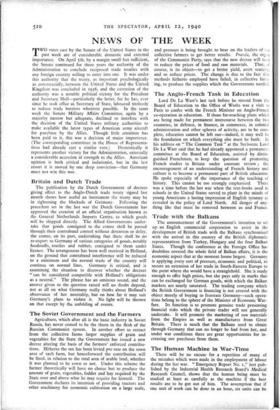NEWS OF THE WEEK
TW0 votes cast by the Senate of the United States in the past week are of considerable domestic and external importance. On April 5th, by a margin small but sufficient, the Senate continued for three years the authority of the Administration to conclude reciprocal trade treaties with any foreign country willing to enter into one. It was under this authority that the treaty, as important psychologically as commercially, between the United States and the United Kingdom was concluded in 1938, and the extension of the authority was a notable political victory for the President and Secretary Hull—particularly the latter, for he has, ever since he took office as Secretary of State, laboured tirelessly to reduce trade barriers wherever possible. In the same week the Senate Military Affairs Committee, again by a majority narrow but adequate, declined to interfere with the decision of the United States military authorities to make available the latest types of American army aircraft for purchase by the Allies. Though little attention has been paid to it, this was a decision of major importance. (The corresponding committee in the House of Representa- tives had already cast a similar vote.) Domestically it represents another victory for the Administration, externally a considerable accession of strength to the Allies. American opinion is both critical and isolationist, but in the last resort it is moved by one deep conviction—that Germany must not win this war.


































 Previous page
Previous page